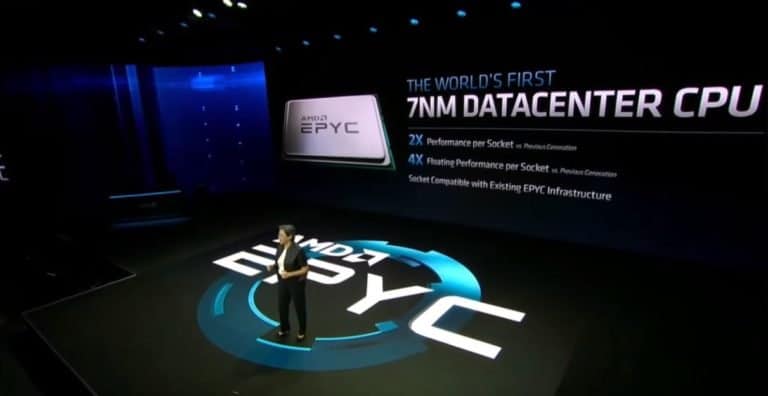AMD plans to launch new versions of its Epyc and Ryzen processors in the middle of this year. At CES, the company shows how the 7 nm chips present Intel with a major challenge.
AMD is fully on track with the development of its second generation Epyc server processors. That’s what CEO Lisa Su says at CES in Las Vegas. This summer the newest Epycs have to roll off the band. The chips are baked using a 7 nm process. In theory, this guarantees better performance at lower energy consumption and therefore lower temperatures. The chip is built around the new Zen 2-cpu-core.
Faster over the entire line
Compared to the previous generation of Epyc server chips, the new copies should offer up to four times more floating point performance, with a doubling of the available pks per socket across the board. The cpus will have a maximum of 64 cores and 128 threads. The CPU also remains compatible with the existing Epyc infrastructure, so that organisations can only upgrade the chip if they wish, without the need for a completely new server.
Read this: Intel launches 10 nm Nova chips for AI workloads
AMD in its presentation puts a single unspecified 7 nm Epyc chip against two high end Intel Scalable Xeon 8180-cpus. In a pre-recorded demonstration, we see how the single Epyc chip performs a scalable scientific application 15 percent faster than the two Intel chips. Su therefore promises that Epyc will be the best choice for all computer-intensive tasks. Su also informs us that news about dual socket Epyc configurations will follow soon.
Ryzen
The Ryzen chips for gamers, creative minds and enthusiasts also receive a 7 nm upgrade. The third generation of Ryzen-cpus is also based on Zen 2. In a live demonstration we see an unspecified Ryzen chip compete against an Intel Core i9-9900K. The Ryzen-cpu has 8 cores and 16 threads, but has no name yet and not even an official final clock speed.
In the live demonstration, the AMD and Intel chip compete against each other in the popular Cinebench test. Not only is the Ryzen CPU faster, the processor also appears to be a lot more economical than the Intel alternative. This is of course a direct consequence of the 7 nm technology. The third generation of Ryzenpus is also planned for mid-2019.
Intel and 10 nm
So it looks like AMD again has a solid lineup ready to beat Intel. The company doesn’t communicate on pricing yet, but if AMD maintains its current strategy, you can be sure that Epyc and Ryzen chips will be consistently more competitively priced than Intel processors with similar capabilities.
AMD compares at the presentation its 7 nm processors with 14 nm-cpus from Intel. However, by the end of the year Intel will launch its own 10 nm chips. That’s later than the launch of the third generation Ryzen and the second generation Epyc, and besides that Intel first uses the laptop. For years, Team Blue has maintained that its 10nm technology is far more advanced than its competitors, particularly TSMC and Samsung. 10 nm at Intel would be more in line with 7 nm at those fabs. In the near future, we will finally be able to see what’s in it.
Related: 10 nm Ice Lake processors appear this year
This news article was automatically translated from Dutch to give Techzine.eu a head start. All news articles after September 1, 2019 are written in native English and NOT translated. All our background stories are written in native English as well. For more information read our launch article.